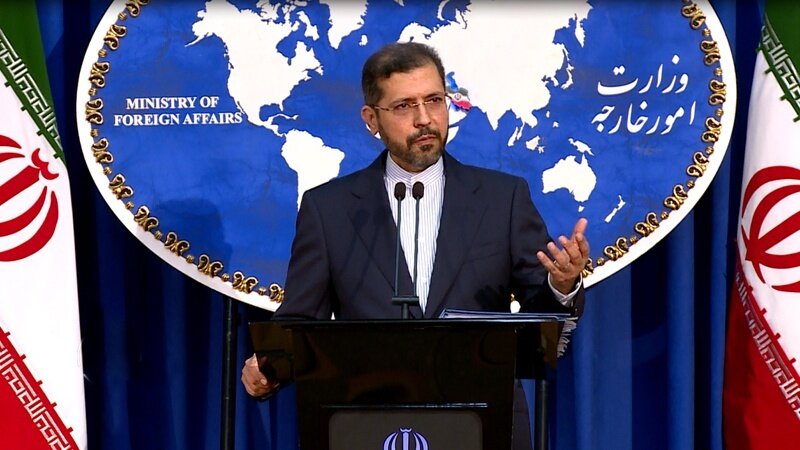Iran says it always welcomes dialogue with Saudi Arabia

TEHRAN – In its first official reaction to media reports of talks between Iran and Saudi Arabia, the Iranian Foreign Ministry said it welcomes dialogue with the Saudi kingdom because such a dialogue is in the interest of the region.
Saeed Khatibzadeh, spokesman for Iran’s Foreign Ministry, responded to foreign media reports of talks between Tehran and Riyadh in Baghdad by saying that Iran supports dialogue with the Saudis. The spokesman did not deny that such talks took place in Iraq.
Speaking at a weekly press briefing, Khatibzadeh said, “We have seen these press reports. Conflicting quotes have been reported in these reports. The Islamic Republic of Iran has always welcomed dialogue with the Saudi kingdom and considered it in the interest of the peoples of the two countries as well as regional peace and stability. [Iran] will continue to think this way.”
The Financial Times reported on Sunday that Saudi and Iranian officials held the first round of their bilateral talks in Baghdad on April 9 and the next round is scheduled to take place next week. Citing regional officials, the newspaper said the Yemeni Ansarallah’s attacks on Saudi Arabia were discussed in the negotiations.
Reuters confirmed the Saudi-Iranian talks, saying they touched on Lebanon, which is facing a political vacuum amid a dire financial crisis.
Saudi Arabia severed diplomatic relations with Iran in January 2016 after Iranian protesters, enraged by the Saudi execution of prominent Shia cleric Sheikh Nimer al-Nimr, stormed its embassy in Tehran. Since then, Saudi Arabia has struck a tough tone on Iran and strongly supported former U.S. President Donald Trump’s so-called “maximum pressure” campaign against Iran.
The reported talks in Baghdad are thought to be the first serious contact between Tehran and Riyadh since 2016.
Saudi Arabia denied the talks. Citing a senior Saudi official, the Saudi-owned Arab News said no direct talks have been held with Iran.
Earlier this year, Khatibzadeh expressed Iran’s readiness to patch up relations with Saudi Arabia. He pointed out that if Riyadh seriously puts policy reforms on its agenda and concludes that the solution to problems lies in “regional cooperation,” Iran will be the first country to welcome these reforms.
“We have always underlined that regional countries should arrive at a common understanding regarding the regional problems,” Khatibzadeh stated, noting that such understanding would help establish a “security mechanism” that could be used to govern the region.
“The Saudis may have some concerns, and by the way, we emphasize that we need to talk about these concerns,” Iran’s Foreign Ministry spokesman said.
The Baghdad talks come amid a new round of diplomatic tensions between Iran and Saudi Arabia over the renewed nuclear deal talks in Vienna. Last week the heads of the Arab League and the (Persian) Gulf Cooperation Council issued statements criticizing Iran. The Arab League expressed “extreme concern” over Iran’s decision to enrich uranium up to 60% purity, calling it a “dangerous development.”
Secretary-General of the Arab League Ahmad Abul Gheit also accused Iran of taking a step toward developing a nuclear weapon.
In addition, an official source at the pan-Arab organization also accused Iran of violating its obligations under the 2015 nuclear deal, officially known as the Joint Comprehensive Plan of Action (JCPOA).
“This regrettable development comes as part of Iran’s continued violations of its obligations under the nuclear agreement, which is currently at the center of intense negotiations to revive it,” the official said, underlining the need to reach an agreement that will address the Arab countries’ concerns related to Iran’s regional activities.
On Wednesday, the (P)GCC secretary-general echoed similar concerns. In letters to the negotiating parties in Vienna – China, Russia, France, the U.S., UK, and Germany- Nayef Al-Hajraf said the Iran nuclear deal talks in Vienna must address the concerns and interests of the Persian Gulf countries to boost security and stability in the region.
Al-Hajraf claimed that the (P)GCC is a major contributor to strengthening the security and stability of the region and that the negotiations currently underway in Vienna should not be limited to the Iranian nuclear program, but rather should include Iran’s alleged “destabilizing” behavior, and ballistic missiles, according to Arab News.
Iran rejected the remarks by Abul Gheit and Al-Hajraf as “interventionist and irresponsible,” saying they are intended to disrupt the Vienna talks.
“These statements are not aimed at calling for cooperation; rather, they seek to disrupt the trend of technical talks in Vienna,” Khatibzadeh said.
“The secretaries-general of these institutions should know that Iran is a member of the International Atomic Energy Agency (IAEA) and all of Iran’s nuclear activities are monitored by the safeguards programs of this agency,” said the spokesman.
“Easing ongoing tensions in the region”
If true, the Baghdad talks could even soothe tensions over the Vienna talks. Reuters quoted an Iran official as underlining that these talks could lead to easing tensions in the region.
“This was a low-level meeting to explore whether there might be a way to ease ongoing tensions in the region,” the official said.
Over the past few years, Saudi Arabia has repeatedly shunned Iranian offers of talks, aligning itself with the now failed maximum pressure campaign led by the Trump administration against Iran. The Saudis pinned hope on the Trump administration and were waiting to see how the U.S. economic pressure would end with Iran. But their whole world came crashing down when they saw American officials admitting that the so-called maximum pressure campaign failed to bring Iran to its knees.
Leave a Comment